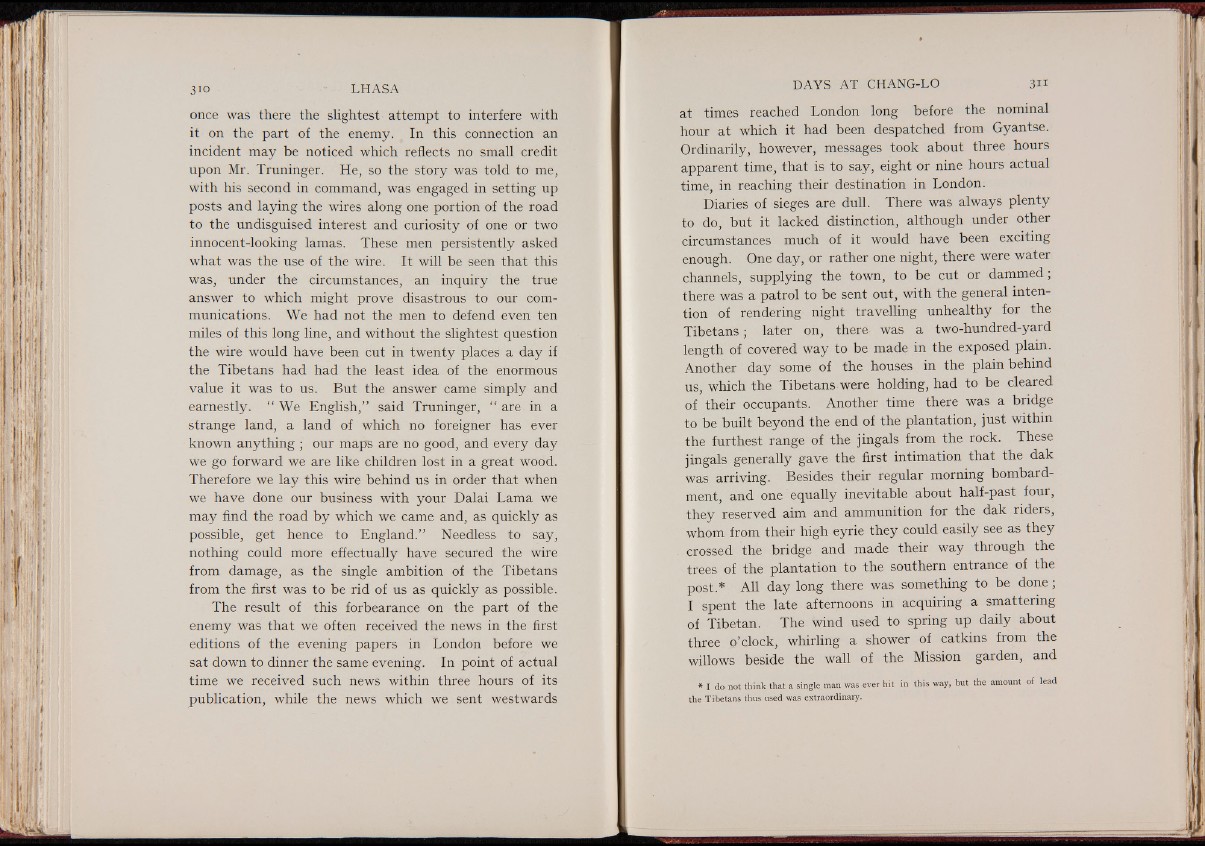
once was there the slightest attempt to interfere with
it on the part of the enemy. In this connection an
incident may be noticed which reflects no small credit
upon Mr. Truninger. He, so the story was told to me,
with his second in command, was engaged in setting up
posts and laying the wires along one portion of the road
to the undisguised interest and curiosity of one or two
innocent-looking lamas. These men persistently asked
what was the use of the wire. It will be seen that this
was, under the circumstances, an inquiry the true
answer to which might prove disastrous to our communications.
We had not the men to defend even ten
miles of this long line, and without the slightest question
the wire would have been cut in twenty places a day if
the Tibetans had had the least idea of the enormous
value it was to us. But the answer came simply and
earnestly. “ We English,” said Truninger, “ are in a
strange land, a land of which no foreigner has ever
known anything ; our maps are no good, and every day
we go forward we are like children lost in a great wood.
Therefore we lay this wire behind us in order that when
we have done our business with your Dalai Lama we
may find the road by which we came and, as quickly as
possible, get hence to England.” Needless to say,
nothing could more effectually have secured the wire
from damage, as the single ambition of the Tibetans
from the first was to be rid of us as quickly as possible.
The result of this forbearance on the part of the
enemy was that we often received the news in the first
editions of the evening papers in London before we
sat down to dinner the same evening. In point of actual
time we received such news within three hours of its
publication, while the news which we sent westwards
at times reached London long before the nominal
hour at which it had been despatched from Gyantse.
Ordinarily, however, messages took about three hours
apparent time, that is to say, eight or nine hours actual
time, in reaching their destination in London.
Diaries of sieges are dull. There was always plenty
to do, but it lacked distinction, although under other
circumstances much of it would have been exciting
enough. One day, or rather one night, there were water
channels, supplying the town, to be cut or dammed;
there was a patrol to be sent out, with the general intention
of rendering night travelling unhealthy for the
Tibetans; later on, there was a two-hundred-yard
length of covered way to be made in the exposed plain.
Another day some of the houses in the plain behind
us, which the Tibetans were holding, had to be cleared
of their occupants. Another time there was a bridge
to be built beyond the end of the plantation, just within
the furthest range of the jingals from the rock. These
jingals generally gave the first intimation that the dak
was arriving. Besides their regular morning bombardment,
and one equally inevitable about half-past four,
they reserved aim and ammunition for the dak riders,
whom from their high eyrie they could easily see as they
crossed the bridge and made their way through the
trees of the plantation to the southern entrance of the
post.* All day long there was something to be done;
I spent the late afternoons in acquiring a smattering
of Tibetan. The wind used to spring up daily about
three o’clock, whirling a shower of catkins from the
willows beside the wall of the Mission garden, and
* I do not thinlc that a single man was ever hit in this way, but the amount of lead
the Tibetans thus used was extraordinary.